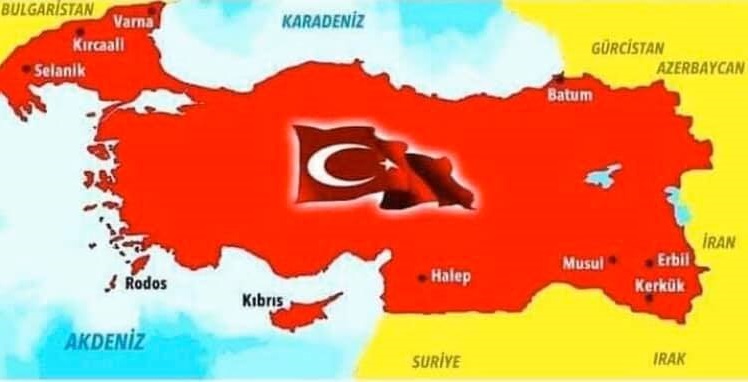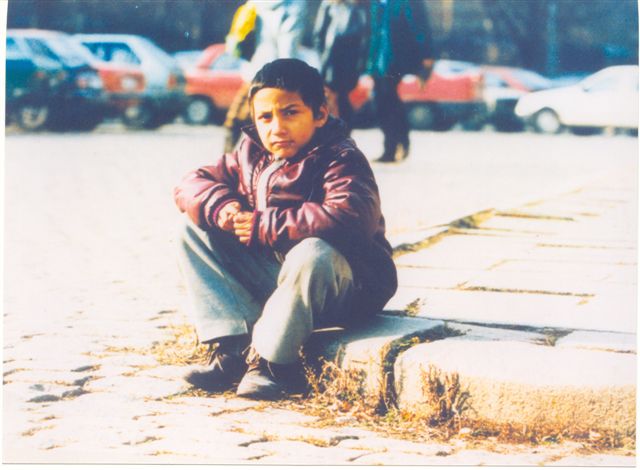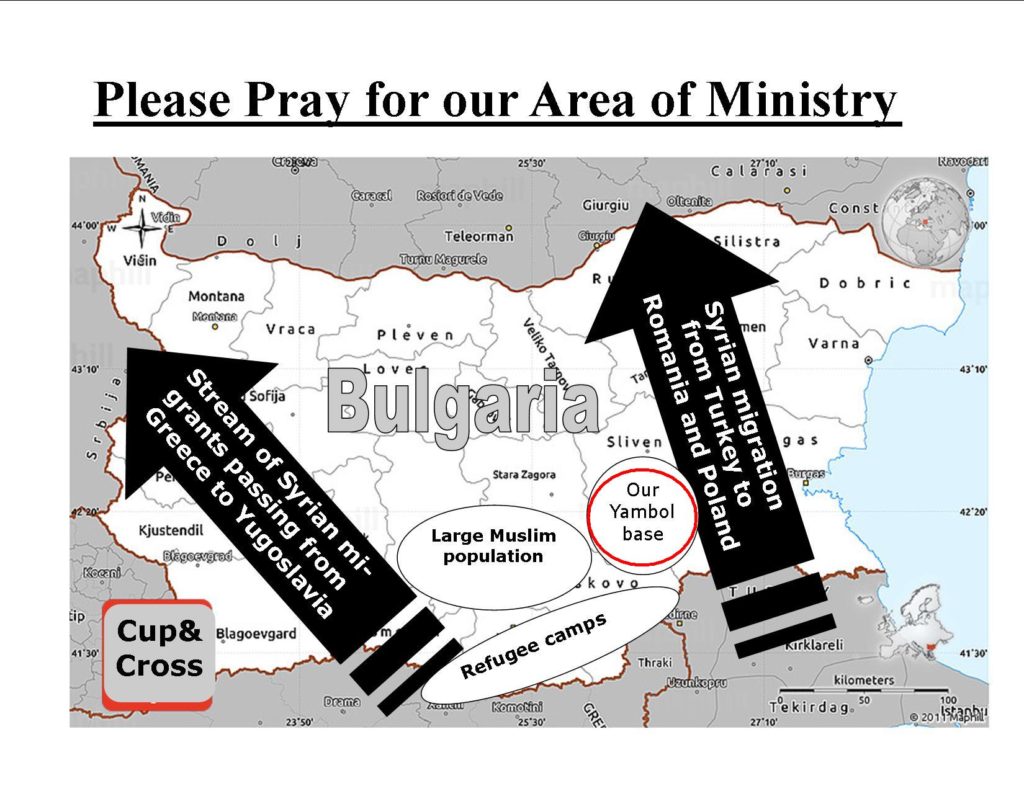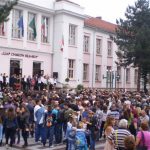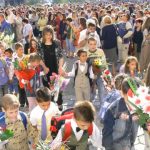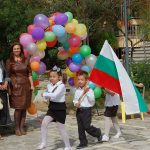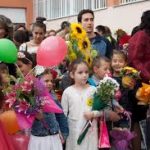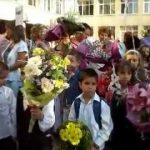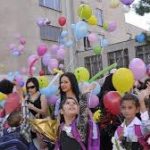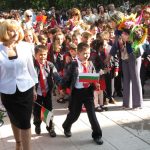30 Years after Communism…
The Fall of the Berlin Wall was on the evening of November 9, 1989

30 years in 60 seconds at the red-light…
I’m driving slowly in the dark and raining streets of my home town passing through clouds of car smoke. The gypsy ghetto in the outskirts of town is covered with the fog of fires made out of old tires burning in the yards. And the loud music adds that grotesque and gothic nuance to the whole picture with poorly clothed children dancing around the burnings.
The first red light stops me at the entrance to the “more civilized” part of the city. The bright counter right next to it slowly moves through the long 60 seconds while tiredly walking people pass through the intersection to go home and escape the cold rain. The street ahead of me is already covered with dirt and thickening layer of sleet.
This is how I remember Bulgaria of my youth and it seems like nothing has changed in the past 30 years.
The newly elected government just announced its coalition cabinet – next to a dozen like it that had failed in the past two decades. The gas price is holding firmly at $6/gal. and the price of electricity just increased by 10%, while the harsh winter is already knocking at the doors of poor Bulgarian households. A major bank is in collapse threatening to take down the national banking system and create a new crisis much like in Greece. These are the same factors that caused Bulgaria’s major inflation in 1993 and then hyperinflation in 1996-97.
What’s next? Another winter and again a hard one!
Ex-secret police agents are in all three of the coalition parties forming the current government. The ultra nationalistic party called “ATTACK” and the Muslim ethnic minorities party DPS are out for now, but awaiting their move as opposition in the future parliament. At the same time, the new-old prime minister (now in his second term) is already calling for yet another early parliamentarian election in the summer. This is only months after the previous elections in October, 2014 and two years after the ones before them on May 2013.
Every Bulgarian government in the past 30 years has focused on two rather mechanical goals: cardinal socio-economical reforms and battle against communism. The latter is simply unachievable without deep reformative change within the Bulgarian post-communist mentality. The purpose of any reform should be to do exactly that. Instead, what is always changing is the outwardness of the country. The change is only mechanical, but never organic within the country’s heart.
Bulgaria’s mechanical reforms in the past quarter of a century have proven to be only conditional, but never improving the conditions of living. The wellbeing of the individual and the pursuit of happiness, thou much spoken about, are never reached for they never start with the desire to change within the person. For this reason, millions of Bulgarians and their children today work abroad, pursuing another life for another generation.
The stop light in front of me turns green bidding the question where to go next. Every Bulgarian today must make a choice! Or we’ll be still here at the red light in another 30 years from now…
The Legacy of Dr. Nicholas Nikolov and the Bulgarian Pentecostal Union
Dr. Nicholas Nikolov passed to Glory on November 6, 1964. After his death, his wife Martha visited Bulgaria twice in 1976 and 1978, the second time for the 50th anniversary of the Pentecostal Union there where their legacy is strongly remembered to this day.
 The organizational talent of Nicholas Nikolov applied with the Pentecostal movement in Bulgaria shaped the history and set a course for the next century. A study on his role and leadership cannot be completed without pointing to the key factors of his ministerial and organizational success despite the divisions present in the Union.
The organizational talent of Nicholas Nikolov applied with the Pentecostal movement in Bulgaria shaped the history and set a course for the next century. A study on his role and leadership cannot be completed without pointing to the key factors of his ministerial and organizational success despite the divisions present in the Union.
After reviewing Nikolov’s work in Bulgaria, it is becoming clear that it was not the cause for a split among Bulgarian Pentecostals in 1928 as often held. The official registration of the new organization simply confirmed a deepening division that had began with the very start of the movement. More important for us today are the factors that helped Nikolov establish, grow and ensure the future of the Pentecostal organization, while many older and more experienced Bulgarian leaders failed and lost their rightful place in history.
Firstly, what other nucleases within early Bulgarian Pentecostalism lacked in comparison with Nikolov’s Union, was the strong support from abroad (educational, financial and otherwise). It proved indispensable in the Bulgarian context of ministry shaped by deep economic crises and spiritual hunger after WWI. Nikolov found way to implement this advantage effectively in areas where the few before him did not succeed.
Based on his strong relationship with Assemblies of God headquarters in Springfield came the clear articulation of doctrinal understanding expressed in a written statement of faith and praxis. In all fairness, neither faith nor praxis borrowed from the American Assemblies of God fit perfectly the primitive Pentecostalism of Bulgaria in 1928. But as the Union grew into a nationwide organization, more useful applications of organized life were replicated even after Nikolov had left Bulgaria for good.
Then comes the very strong and effective educational and discipleship vision for denominational growth (also borrowed from the American Assemblies of God). Other Pentecostal groups in Bulgaria were too formed around strong leaders, but as most of them remained in leadership for life their spiritual strength and vision naturally weekend. While the work of the Spirit and the practice of gifts were central among them, any formal education or even basic training in practical ministry and organizational leadership were disregarded as worldly having no place in the Church of God. With this mentality prevalent, many Pentecostal groups did not survive after the passing of their first generation of leaders and disappeared from history – either assimilated by the Pentecostal Union or lost forever.
In contrast, Nikolov gave special use of strategic organizational structure that aided the work of the Spirit and empowered the Pentecostal churches. He also found ways to invest in the development of trained leaders able to build and lead the Union until his initial vision was fulfilled. In the process, some congregations did loose spirituality while gaining more structure and training. But overall, a healthy balance was reached ensuring a growing and spiritual Pentecostal denomination.
Lastly, the decision to comply with government legislation opened doors to cooperate with other Protestants organizations on a national level. This decision brought constant tensions that had to be carefully weighed. Siding with churches of the Bulgarian Evangelical Alliance, many of which subscribed to liberal theology, was seen by the older believers as compromising of the Pentecostal faith. Yet, it gave the young Pentecostal movement much needed credibility.
In a similar matter the government registration, provided a nationwide representation of Pentecostals in religious life and opened doors for renting auditoriums, building sanctuaries and creating a national network of self-sustained churches. Some older Pentecostals still saw this as compromising with the world and an unforgivable sin. Especially when the Communist Regime took over Bulgaria in 1944, most leading Protestant pastors were sentenced to life in prison and their place in the pulpit was filled by government paid agents, who infiltrated the decision making body of the Union and enforced government mandate over the churches.
But it also helped the Union churches survive the Regime and be among the few allowed to have regular meetings and services making them the largest evangelical group in Bulgaria today. Nikolov was right with his decision that a small band of organized Pentecostals was much stronger than any other divided majority. And that empowering Spirit-filled communities with organizational structure and leadership mandate can earn their rightful place in history.
Virtual Real Estate for the Kingdom Conference
Cupandcross.com launched in the fall of 1999. Our first public letter went out for Thanksgiving exactly 20 years ago and snice then has reached thousands of readers, partners and friends each week.
Since these humble beginnings, nontraditional means of increase have provided Cup and Cross with unique opportunities to serve in times of hardship. Investing in Virtual Real Estate (VRE) in the 90s has not only provided an e-pulpit to minister to millions of people, but it has been an unprecedent venture. Acquiring and popularizing top level internet domain names has been a long-time focus of ours and its return to the ministry has been irreplaceable.
Our intent for acquiring domain names has been to allow other ministries or organizations to benefit from and use them for a period of time before sale in order to be a good Stuart of the e-space realty. With the wild fluctuations in the .com market, the potential value also alternates. It has been only with the Lord’s help of seizing the right moment within the divine destiny, that this unique venture has paid off.
Your Website Does Matter
Even if you’re fully engaging your members in church, you still need a church website. Why? According to Grey Matter Research, 17 million Americans who don’t regularly attend church visited a church website. While most are searching for church hours or programs, 26% are streaming video and another 26% are streaming audio. So yes, a website is vital for reaching more people and increasing your members.
Consultation
Beside personal presence and team building strategies, we implement the media in virtually every approach of ministry. We have published several research monographs as well as film series about our ministry work. Our team holds a weekly TV program called the Bible Hour.
Learn how we help churches build their own and unique media presence. For more information about such opportunity feel free to reach out to Cup and Cross. We can provide Internet conferences on the topic or come and visit with you at your church
Turkish “defence” minister posts map of Turkey that includes pieces of Syria, Iraq, Bulgaria, Greece, and all of Cyprus
Turkish Minister of defense Hulusi Akar posted on his own page a map and a message in Turkish and Arabic, basically saying that Turkey is not looking to take over other peoples’ lands, but will take what is their right.
“We have no eyes on anyone’s land. We’re just gonna get back what’s ours,” reads the message which is accompanied by a map which includes within Turkey half of Syria, northern Greece and the Greek islands of the Aegean, and all of Cyprus. It also includes all of northern Iraq including Sulaymaniyah, Erbil, and Kirkuk
What exactly is the Turkish minister saying and what do his friend in Moscow and Washington think of this?
Two Parliamentary Parties Join Outcry against National Child Strategy
 Two parliamentary parties have joined the public outcry against the proposed National Strategy for the Child 2019-2030. Volya and VMRO presented their objections on Wednesday following almost three months of protests by political parties, parent and family associations, and the Bulgarian Orthodox Church. Protesters have said that the draft strategy curtails parents’ rights, downplays the role of the family and gives social services excessive powers. On Tuesday, Labour and Social Policy Minister Bisser Petkov said the strategy will be redrafted to make it acceptable to all stakeholders.
Two parliamentary parties have joined the public outcry against the proposed National Strategy for the Child 2019-2030. Volya and VMRO presented their objections on Wednesday following almost three months of protests by political parties, parent and family associations, and the Bulgarian Orthodox Church. Protesters have said that the draft strategy curtails parents’ rights, downplays the role of the family and gives social services excessive powers. On Tuesday, Labour and Social Policy Minister Bisser Petkov said the strategy will be redrafted to make it acceptable to all stakeholders.
Volya told a news briefing on Wednesday that the strategy should be urgently rewritten and made more concrete. “This is just another administrative, empty-worded document which lacks any
concreteness and clarity,” the party’s Boryana Georgieva said. “We are opposed to any hint in the strategy that children can be easily separated from their parents in pursuance of vaguely formulated provisions in the strategy.”
The party noted that the proposed strategy identifies the same problems that were spelled out in the previous one, adopted in 2008. “It turns out that the strategy has produced no results for 11 years,” Georgieva commented.
Volya called for allocating more funding for lone mothers rather than foster families. “We want the bulk of the money to go to the real families of the children,” Georgieva insisted.
Administrators who promote alien ideologies should be punished (for example, with a fine equivalent to a month’s wage), the party said. Such transgressions include advocacy for “a third gender” and using the terms “parent one” and “parent two” instead of “mother” and “father” in kindergarten admission applications.
Each month, one homeroom session at school should be devoted to the suppression of aggressive behaviour among children, Volya suggested.
Meanwhile, VMRO issued a written statement in which they wondered why the State Agency for Child Protection refused to publish the list of NGOs with which it had discussed the National Strategy for the Child.
VMRO said the draft strategy seeks to impose the view that the government knows what is best for a child. “There is no way that a civil servant knows better than the parent what the best interests of a child are,” the party argued.
“The so-called National Strategy for the Child aims to push through the ‘Istanbul-style’ assumption that the whole Bulgarian nation consists of abusers and criminals who should be placed under surveillance and control for every step they make,” VMRO said. The reference was to the Istanbul Convention (formally: the Council of Europe Convention on Preventing and Combating Violence against Women and Domestic Violence), which Bulgaria has refused to ratify.
Bulgarian PM Moments on State Abducting Children
Bulgarian PM Borissov, Ministers Say Rumors about State Abducting Children Are Monstrous Lie
Sofia (BTA) – Prime Minister Boyko Borissov said the rumours that the State is to abduct children are a monstrous lie and appealed to the media to help clarify the issue. He was speaking at the beginning of Wednesday’s regular meeting of the Council of Ministers.
“I don’t know whose conscience it can give birth to and how can you talk this way. How to speak and protest against a strategy for a child which does not exist? This was declared by Prime Minister Boyko Borisov at a regular government meeting in the Council of Ministers about the hysteria of parents in Sliven, Yambol and Karnobat that social services are taking away their children from school. How can you replicate a lie that Norway has given money to export our children?, the PM was confused and asked the media for help on the news.
“I cannot assume that there is a person to relate to such a lie”emphasized the Prime Minister. He called such “political pastors,” while other government officials declared them protestant evangelicals. The United Evangelical Church Alliance of Bulgaria issued a statement on Thursday denouncing any association with the matter and refuting any allegations toward evangelical pastors – most of which serve as the only educators in the Roma Gypsy ghettos across Bulgaria where government help is rarely available for childen.
Please Pray for our Area of Ministry in Bulgaria
Turkish operation may redraw map of Syrian and Cyprus
Syria Could be Turkey’s Vietnam
Erdoğan may believe striking a blow against Kurds while confiscating their oil is a win for Turkey, but he is wrong: He is simply opening the door for a war of attrition that Turkey cannot afford and which it ultimately might lose.
Turkey launched a military operation against Kurdish fighters in northeast Syria on Wednesday, with air strikes hitting the border town of Ras al Ain. The operation could reshape the map of the Syrian conflict once again, dealing a blow to Kurdish-led forces that have battled Islamic State while widening Turkey’s territorial control at the border. It was Turkey’s third such incursion since 2016. Motivated largely by the aim of containing Syrian Kurdish power, Turkey already has troops on the ground across an arc of northwestern Syria, the last stronghold of anti-Damascus rebels.
WHAT DOES TURKEY WANT?
Turkey has two main goals in northeast Syria: to drive the Kurdish YPG militia which it deems a security threat away from its border, and to create a space inside Syria where 2 million Syria refugees currently hosted in Turkey can be settled. It had been pushing the United States to jointly establish a “safe zone” extending 20 miles (32 km) into Syrian territory, but repeatedly warned it could take unilateral military action after accusing Washington of dragging its feet. President Tayyip Erdogan has recently talked about pushing even deeper into Syria, beyond the proposed “safe zone” region to the cities of Raqqa and Deir al-Zor, in order to allow still more refugees to return to Syria.
HOW WILL THE KURDS BE AFFECTED?
The Kurdish-led Syrian Democratic Forces (SDF) have spent years expanding its control across northern and eastern Syria, helped by the U.S.-led coalition against Islamic State. A rare case of a winner in the Syrian war, the Kurds and their allies have set up their own governing bodies while always insisting their aim is autonomy, not independence. All of this could unravel with Turkey’s military advance. The SDF-affiliated Syrian Democratic Council has said an attack would trigger a new wave of mass displacement. For the SDF alliance, in which the Syrian Kurdish YPG militia is the dominant force, much will depend on whether the United States continues to keep forces in other parts of the northeast and east.
A full U.S. withdrawal would expose the area to the risk of more Turkish advances, an Islamic State revival, or attempts by Iranian- and Russian-backed government forces to gain ground. Confronted by the prospect of U.S. withdrawal last year, the Kurds beat a path to Damascus for talks over allowing the Syrian government and its ally Russia to deploy at the border. The talks made no progress, but such negotiations could be an option again in the event of a wider U.S. withdrawal.
HOW FAR COULD TURKEY GO?
The northeastern border region, currently controlled by Kurdish-led forces, stretches 480 km (300 miles) from the Euphrates river in the west to the Iraq border to the east. The immediate focus of Turkey’s military plans appears to be around a section of the border between the towns of Ras al Ain and Tel Abyad, which are about 100 km (62 miles) apart. A U.S. official told Reuters on Monday U.S. forces had withdrawn from observation posts there. As well as air strikes on Ras al Ain on Wednesday, a witness in Tel Abyad said the sound of explosions rang out there and residents fled. Although under the control of Kurdish-led forces, that part of the border has historically had a strong Arab presence. “It’s a region where the population is Arab and where Turkey has good ties with the leading groups,” said Ozgur Unluhisarcikli of the German Marshall Fund. If the YPG tries to hold territory there “it will lose a lot of blood,” he said.
DO RUSSIA AND IRAN BACK TURKEY’S MOVE?
Russia and Iran, the other two major foreign powers in Syria, strongly support President Bashar al-Assad – unlike Turkey and the United States which both called for him to stand down and supported rebels fighting to overthrow him. Russia has said that Turkey has the right to defend itself, but Kremlin spokesman Dmitry Peskov said on Monday that Syria’s territorial integrity must be preserved and that all foreign military forces “with illegal presence” should leave Syria. If the U.S. pulls out all its troops from northeast Syria, the Damascus government – backed by Russia – may try to retake control of much of the region not seized by Turkey.
WHAT IS THE WESTERN REACTION TO TURKEY’S PLAN?
There has been no public support from Turkey’s Western allies for its plan to settle 2 million Syrians – more than half of the refugees it currently hosts – in northeast Syria. A senior U.S. State Department official described the plan as “probably the craziest idea I’ve ever heard”. The main Western concerns are that an influx of Sunni Arab Syrians into the largely Kurdish northeast would change the demographics of the region. The United Nations regional coordinator for the Syria crisis said all sides should avoid major displacement of civilians if Turkey launches an assault.
WHAT DOES THIS MEAN FOR ISLAM?
While the territory in question is already outside Syrian government control, a Turkish incursion could mean the area switching from a non-hostile force – the SDF – to Turkey and rebels that have sought to topple Assad. Damascus has long viewed Turkey as an occupying power with designs on northern Syria. It has also at times suggested a willingness to strike a deal with the Kurds, though their last negotiations got nowhere.
Chaos could present Islamic State with an opportunity to stage a revival and the SDF has been conducting operations against IS sleeper cells since capturing its final territorial foothold earlier this year. Syrian Kurdish leaders have long warned that the SDF may not be able to continue holding IS prisoners if the situation was destabilised by a Turkish invasion. The SDF is still holding 5,000 IS fighters of Syrian and Iraqi nationality and a further 1,000 foreigners from more than 55 other states, according to the foreign relations department of the Kurdish-led administration in northern Syria.
10 Years of Chaplaincy on the High Seas
 We began our literal journey of ministry on the high seas in 2009. After exploring the opportunity for several years’ prior and submitting applications to various chaplaincy organizations which dealt with such ministry, the doors finally opened for Cup and Cross.
We began our literal journey of ministry on the high seas in 2009. After exploring the opportunity for several years’ prior and submitting applications to various chaplaincy organizations which dealt with such ministry, the doors finally opened for Cup and Cross.
This search for a ministerial identity and its proper application in the real world coincided with the start of the Master’s in Chaplaincy Ministry Program which we designed for the Bulgarian Evangelical Theological Institute in Sofia around 2008-2009. The long standing relationships with professors, active military chaplains from various fields and countries, and the wisdom of several Generals in the field helped us calibrate our ministry focus with what is needed by real people in the real world.
The new fad “to be real” is not enough in a realistic ministry setting. When 25ft. high storm waves beat the aft and the ship is thrown towards the dark wall of ocean waters ahead, one cannot help but “to be real” and depend on a very real and skilled crew. A captain alone cannot run the boat through a storm even if all systems are reported working. It is the crew deep down in the engine room and making its way on the slippery deck that makes it all happen.
The Crew. Some of them have not seen their families for months or even a year at times. They struggle with the same fears and anxieties as the rest of us. Except, while the rest of us can hold on to something for dear life, the crew is obligated by duty to continue to serve and move the boat ahead. The little chapel on the top deck becomes a passage to a lagoon past the riffs of stormy life where stories are shared, prayers are lifted up together and human lives are reclaimed anew for Heaven.
We have found these nontraditional paths of travel and ministry yielding the most unique encounters and connections for Kingdom growth. Our family is thankful for these 10 years and looking forward to even more means of ministry outside of the four church walls. If you would like for us to come to your church as share our journey feel free to reach out to us.



